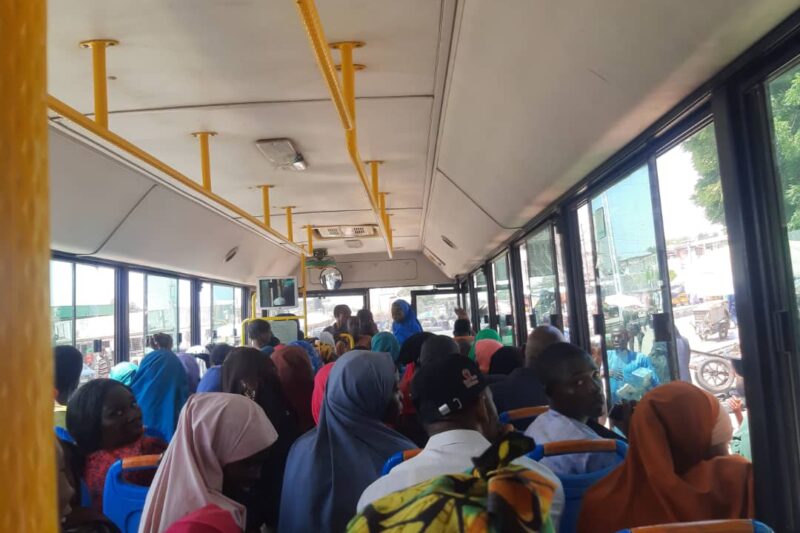Women passengers in Maiduguri say men have been taking advantage of them in overcrowded buses: They touch us inappropriately and if we complain, we are simply told to ‘get off’.
Skyrocketing fuel prices have forced thousands of residents of Maiduguri – the capital of Borno State – to park their cars and hang up their keys … and head for the nearest bus stop.
The price has leapt from ₦200 a litre in May last year to more than ₦1,000 – at some retail outlets the cost is ₦1,250.
In the past week, Ndarason 88.5 Maiduguri has been swamped by calls from listeners – some angry, others just full of despair – who bemoaned the latest fuel hike.
The upward trajectory started on May 29 last year when President Bola Tinubu announced at his inauguration that the “fuel subsidy is gone”.
The aim of removing the subsidy was to cut down on government spending. However, Tinubu had no realistic plan to cushion the hardships that would result.
Immediately the price of fuel began to soar – and the escalation has not stopped.
With the fuel hikes, the cost of all commodities – in particular food, even the basic staples, and transport – have increased. Sky-high inflation and the ever-slumping naira currency have compounded an already economically fraught time resulting in a severe cost-of-living crisis.
In June, Nigeria’s headline inflation rate accelerated to 34.19%, the highest since March 1996. The naira is in freefall, depreciating more than 50% since Olayemi “Yemi” Cardosa assumed the governorship of the Central Bank of Nigeria (CBN) a year ago.
A study by the United Nations Food and Agriculture Organisation, the Global Alliance for Improved Nutrition and the German development agency, GIZ, says more than 31.8 million Nigerians are acutely short of food.
To try to ease the cost of transport in the state, the Borno State government bought more than 1,000 mega-, medium- and minibuses, including electric vehicles.
The fare for the buses has been kept at ₦50. This compares favourably with the ₦200 fare of commercial tricycles – what used to be the main means of transport for city dwellers.
And it explains the extremely long queues at bus stops.
Grema Zanna Kyari, the general manager of the Borno Express, told RNI that about 400,000 residents of the city use the bus service daily.
“With the latest fuel hike, that number is set to increase,” he said.
When the new buses came into operation, low- to middle-income earners were delighted – particularly women, who make up more that 85% of passengers because of their limited access to wealth.
The Kanuri word “Nkanjimoli”, loosely translated as “mercy”, was given to the bus service by its users.
That alone describes how important the bus service is to residents – particularly women.
With the recent fuel hike, Nkanjimoli is becoming even more attractive as hundreds of new users turn to bus transport every day.
But, with the increased demand, tension between passengers has also escalated.
Women said seating arrangements were no longer respected and other protocols not observed.
To accommodate more passengers, drivers have been allowing more people to board. On a 55-seater bus, for example, drivers allow 100 passengers.
Women passengers – as well as disabled people – complain that men “take ownership” of buses, denying “weaker members of the public” access.
On Wednesday, October 2, Ndarason visited the motor-park to investigate complaints received by its listeners.
Fatima Usman, 27, a student at Borno State University, said apart from the difficulties women faced gaining access, it was also not safe for women to use the service.
“When the seats are all occupied, the remaining passengers stand. Once you are standing, some men stand directly behind you and intentionally touch your body, taking advantage of the bus being overcrowded.
“If you complain, the driver tells you to get off the bus and wait for another bus or use a tricycle that costs ₦200 per drop. The bus costs just ₦50. So, we just keep quiet and stop complaining.
“The buses are a nightmare for children. You hear children crying and screaming because they can hardly breathe. It’s so hot and there are so many people. It’s no use complaining. The answer is simple: ‘Get off!’
“People who suffer from asthma also have a hard time. They are forced for financial reasons to use the bus service, but most cannot complete a trip because they cannot breathe. There are too many people.
“On two occasions I have seen asthmatic patients cut their trip short before they got near to their destinations. They were struggling to breathe. They just got off the bus,” Fatima said.
“As the economy continues to deteriorate, more than 50% of residents of Maiduguri now rely on buses daily,” said Abubakar Aliyu, a public affairs analyst.
“I can remember when the buses were first introduced – very few people used them. They felt ashamed to be seen on a bus because it meant they were poor.
“It was not long ago that people laughed at those on the buses calling them names. But that’s no longer the case. The current economic hardship is hitting everyone. There’s no such thing as a middle-class family in Nigeria today; that status has been eroded. Now everyone is struggling financially,” said Aliyu.
Fatima Musa, 44, runs a small restaurant in Maiduguri.
From her house in Bulumkutu to her restaurant in the Tashan Bama area of the city, she takes at least four different buses to and from work every day.
“What seating arrangement? You are lucky if you get a seat. I hate it but I have to rely on the buses. I spend ₦200 every day.
“If I were to take four commercial tricycles it would cost me ₦800. The difference is enormous. As a small business owner, I have no choice than to use the buses.”
On Friday, October 04, two days after the programme – in which passengers expressed their views on the bus service and its failings – aired on Ndarason 88.5 Maiduguri, the management of Borno Express asked for right of reply.
Borno Express did not want to comment on air during the programme.
Kyari told RNI that management had warned drivers to stick to refrain from overloading buses.
“We suspended two drivers for allowing overloading. We took action during a supervisory visit.
“But to be honest with you, it is clear that drivers are helpless and can’t do much. In the current economic climate, there are so many people who use the service. They all troop on to the bus, pushing and shoving, and it is extremely difficult for the driver to impose the no overcrowding policy. No one listens. And if he insists, it could lead to a conflict.
“Nearly 400,000 people rely on the buses for their daily activities. It’s a huge number and, with the recent rise in the cost of fuel, it is likely to get much higher. The state government is aware of the problem and is working hard to procure more buses to ease transportation.”
Kyari assured Ndarason that management would look into the concerns raised by the people and come up with solutions as soon as possible.
Kyari was true to his word. Management held a meeting with drivers on Sunday, October 6, and a revised policy came into effect on Monday, October 7.
Ndarason visited the motor-park for the second time on Wednesday, October 9.
Our reporter boarded a bus at Office Area and was pleasantly surprised.
All passengers were seated and not a single person was allowed to stand. Once all the were seated, the trip commenced.
Abdullahi Idriss, the driver, said he was delighted because it took a much shorter time to load passengers.
“Before it took us 20 minutes but now it takes less than five minutes. It allows us to undertake more trips. The passengers are happy and they are complying with the revised policy.”
Seated at a window, passenger Fatima Ali, who boarded the bus at Office Area and was heading to the Umaru Shehu Ultra-Modern Hospital Bulunkutu, said she was extremely impressed.
“I don’t have the right words to describe my joy. I want to thank everyone involved. I feel much safer and I will be able to move comfortably around the city without any problems.”
“Today [Wednesday, October 9] is the second time I am using the bus service. The first time was four months ago. I decided then that I would not use it again for safety reasons. As a young woman, I really did not feel safe. But I can honestly say today is an improvement and I will be using the bus from now on”.
Another passenger, Hajju Lawan Bukar, thanked the management but urged them “to keep up the good work”.
“As you can see, we are happy and comfortable. But it is up to the drivers and passengers to keep it like this..
“The best way to sustain this is for the management to keep its promises and for the drivers to enforce the revised policy. Passengers must respect the changes and take ownership by reporting any driver who violates the policy,” Hajju said.
MAMMAN MAHMOOD








